Church
Last session of Christianity Explored tonight. Looking forward to running it again next year.

One of the cool things about running Christianity Explored is hearing the questions people want answered. Some questions seem simple on the surface but actually get to why there were multiple councils in the 4th and 5th centuries. Understanding Jesus is really hard.
Christianity Explored starts today at Ardgowan Square. Both nervous and excited to see how it goes.
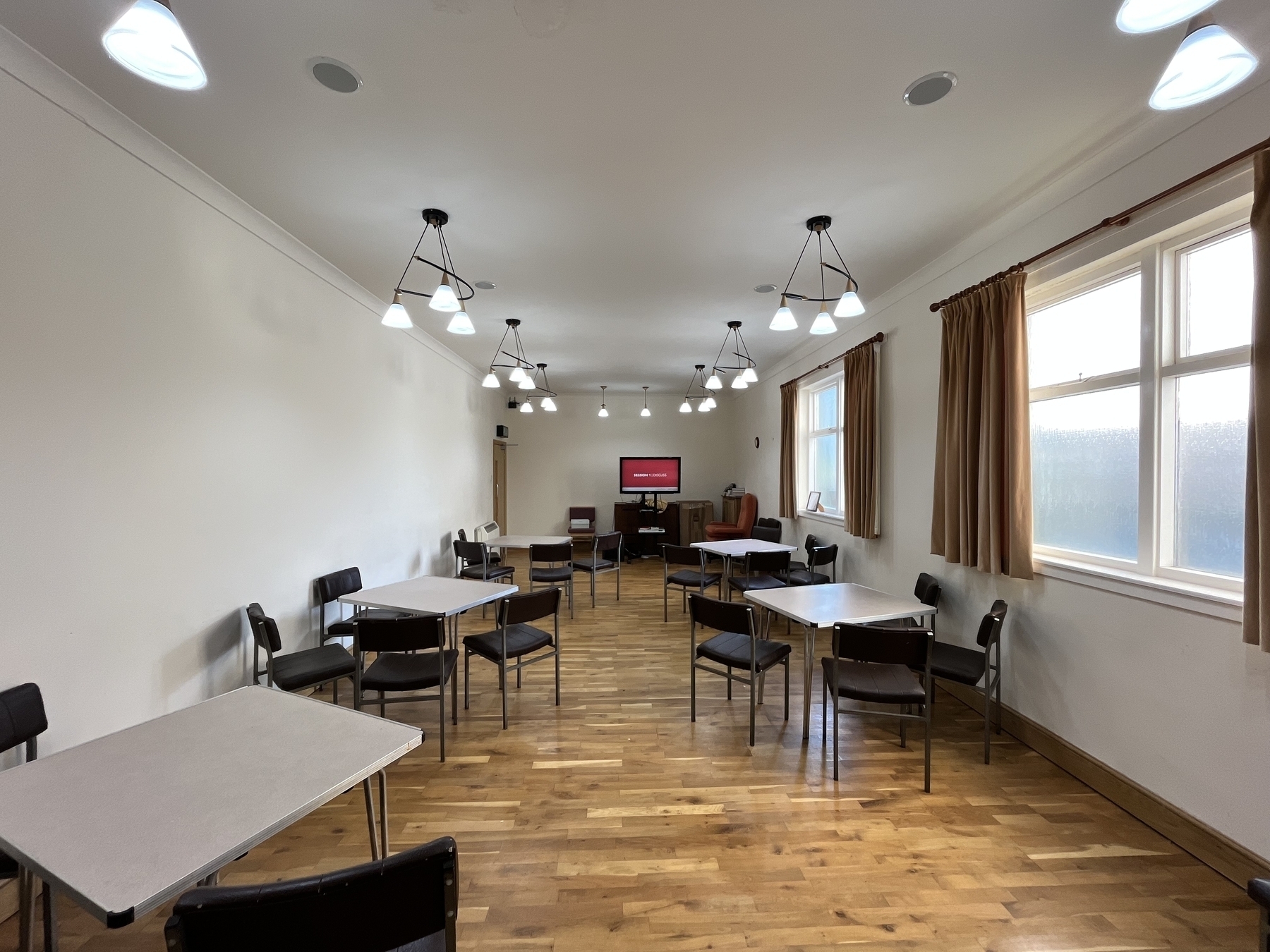
some observations on being a disciple
I’m preaching through a bit of a topical series at the moment, where the topics are from the Great Commission in Matthew 28:18-20. My normal mode of teaching is expository, but this is proving to be a good exercise as well. It’s helpful for us to see how things in Scripture join up, and everything is joined up.
My main anchor text for this week is the closing section of Jesus’ prayer in John 17:20-26. It’s a slightly odd place to go when thinking about discipleship, but there is definitely that line of thinking within it.
As Jesus prays, he knows that the cross is coming and he knows that his disciples are going to need help. And so within earshot of them, he prays to his Father and talks about all that he has done. He praises his Father, perfectly. He says he has given his disciples the Father’s word. He asks the Father to set them apart in the truth, which is his word.
And then he speaks of those who will come to faith later.
“I do not ask for these only, but also for those who will believe in me through their word, that they may all be one, just as you, Father, are in me, and I in you, that they also may be in us, so that the world may believe that you have sent me. The glory that you have given me I have given to them, that they may be one even as we are one, I in them and you in me, that they may become perfectly one, so that the world may know that you sent me and loved them even as you loved me. Father, I desire that they also, whom you have given me, may be with me where I am, to see my glory that you have given me because you loved me before the foundation of the world. O righteous Father, even though the world does not know you, I know you, and these know that you have sent me. I made known to them your name, and I will continue to make it known, that the love with which you have loved me may be in them, and I in them.” (John 17:20-26 ESV)
There is much more to be said about this, but some of what I can see as I work through this and prepare to preach on Sunday is:
Disciples believe through the testimony of other disciples
While it’s tempting to believe that we just need to live a good, moral life to be a sharing the gospel, its clear from Scripture that using words to communicate the gospel is the way that people come to believe.
Disciples are united together in Christ
I’ve heard people say that you don’t need to go to church to be a good Christian. Or that the church should really be about social action or something else. In reality, the reason why the church exists is because it is a gathered group of people who have been united to and in Christ. He is the reason why the church gathers. He is the reason why this odd mix of people from different backgrounds, classes, races, political persuasions can coexist in the very same community. Jesus breaks down all of those barriers and joins people together in him.
Disciples are united together to be a witness
Us being together and united in Christ shows the world that Jesus is sent by the Father. He says so right there in his prayer. They reason why Jesus wants Christians to be united together is because it is how the world knows that we are loved by God. Jesus was sent because God loved the world, and Christians united around that fact is the testimony to that being true. The proof of who Jesus is and what he did is in the miracle of Christian community.
Disciples want to take the message to the world
At a conference this summer, Richard Pratt explained that the mission the disciples had was to take the whole world for Jesus. Jesus explicitly tells the disciples to go and make disciples of all nations. This wasn’t some isolated mission only meant for 1st century Palestine. It started there, but it won’t end there. Because God’s people have taken this message and mission seriously, there are more Christians around the world in more places than there have ever been at any point in history. For example. In 1 AD, the world population was about 300 million people. Today, there are between 80 and 100 million Christians in China alone.
While the mission is far from over and the work is far from complete, there is much reason to be encouraged and much reason to continue to persevere in telling people about Jesus.
At my own church, we are preparing to run Christianity Explored next month. If you’re reading this and are a Christian, please pray for us. Pray that we would be asking people to come, pray that they would actually come, and pray that we would trust God to be at work in the hearts of those who do come. Pray that we would be encouraged to share the gospel and that we would be brave.
a week of serving, learning and eating pies
I’m recently back from a week of ministry with Maxwell Church in Kilmaurs and Kilmarnock in Ayrshire. This was an opportunity to experience a different church in a different area to see how ministry is similar and different in a new context. I was there with two fellow-Cornhill students, though my experience was slightly different as I stayed in the area overnight. From the outset, what was intended by our hosts was for us to get a glimpse of ordinary church ministry.
A lot of times, it’s tempting to put on lots of different events during a mission week. Those things are good and they’re exciting but they also tend to be an anomaly. It isn’t like that most of the time.
So here’s a bit of a recap of what happened and what I’m able to take from the week.
what we did
Day 1
The first day, we were briefed on what the week would look like before getting to observe a meeting with SU Scotland to plan the church’s holiday club. The church is in partnership with them while they work to train up leaders and volunteers who can help sustain the ministry long term.
Before and after lunch (trying my first Killie pie, which would become a bit of a theme during the week) Nathan, the minister, told us the background story of the church. It had dwindled to a congregation of only 15 people and through a lot of work, preaching and hard conversations is now well on its way to revitalising.
In the evening, we sat in on a presbytery meeting which was mainly boring but, again, there is much to the work that can be that way.
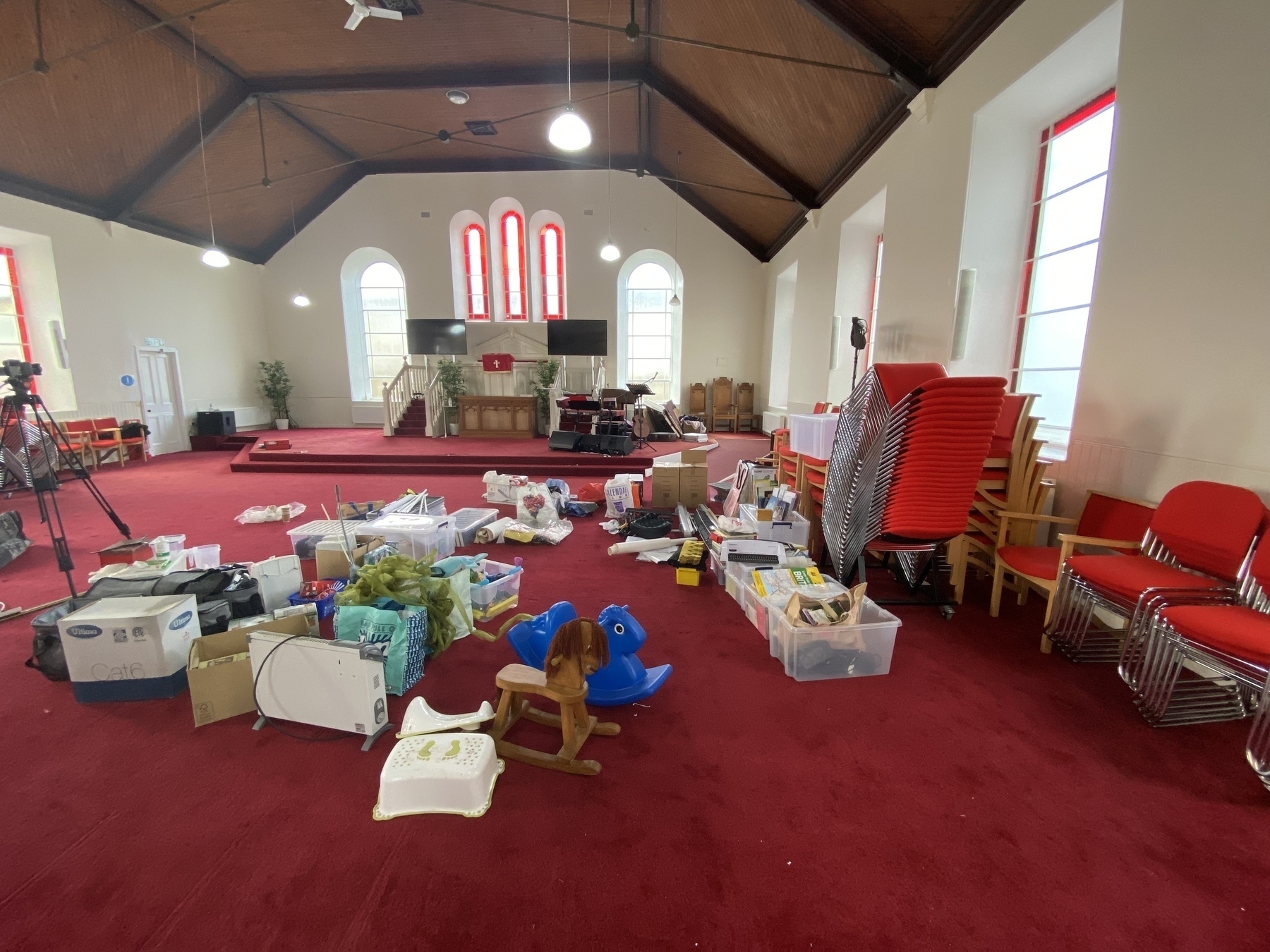
Day 2
A day for cleaning. One of the things that happens in churches with very small (or no) staff teams is that some tasks end up piling up. In this case, we helped the pastor and assistant pastor work through two cupboards that we just full of the sort of thing that can pile up in churches. It was dusty, but it was good to be able to help them with something that would have taken much longer were they not assisted by the three of us to move things around.
Lunch was pies from a different bakery.
In the evening, we got to join the church’s growth group for a time of prayer and looking at the first chapter of 1 Peter. 1 Peter is a book that feels so very contemporary, I remember our church in Liverpool preaching through it when we arrived there. An ongoing topic in the New Testament is just the constant encouragement to persevere. Following Jesus is hard to do whether you’re being actively persecuted or trying not to become materialistic or trying to point your kids to Jesus.
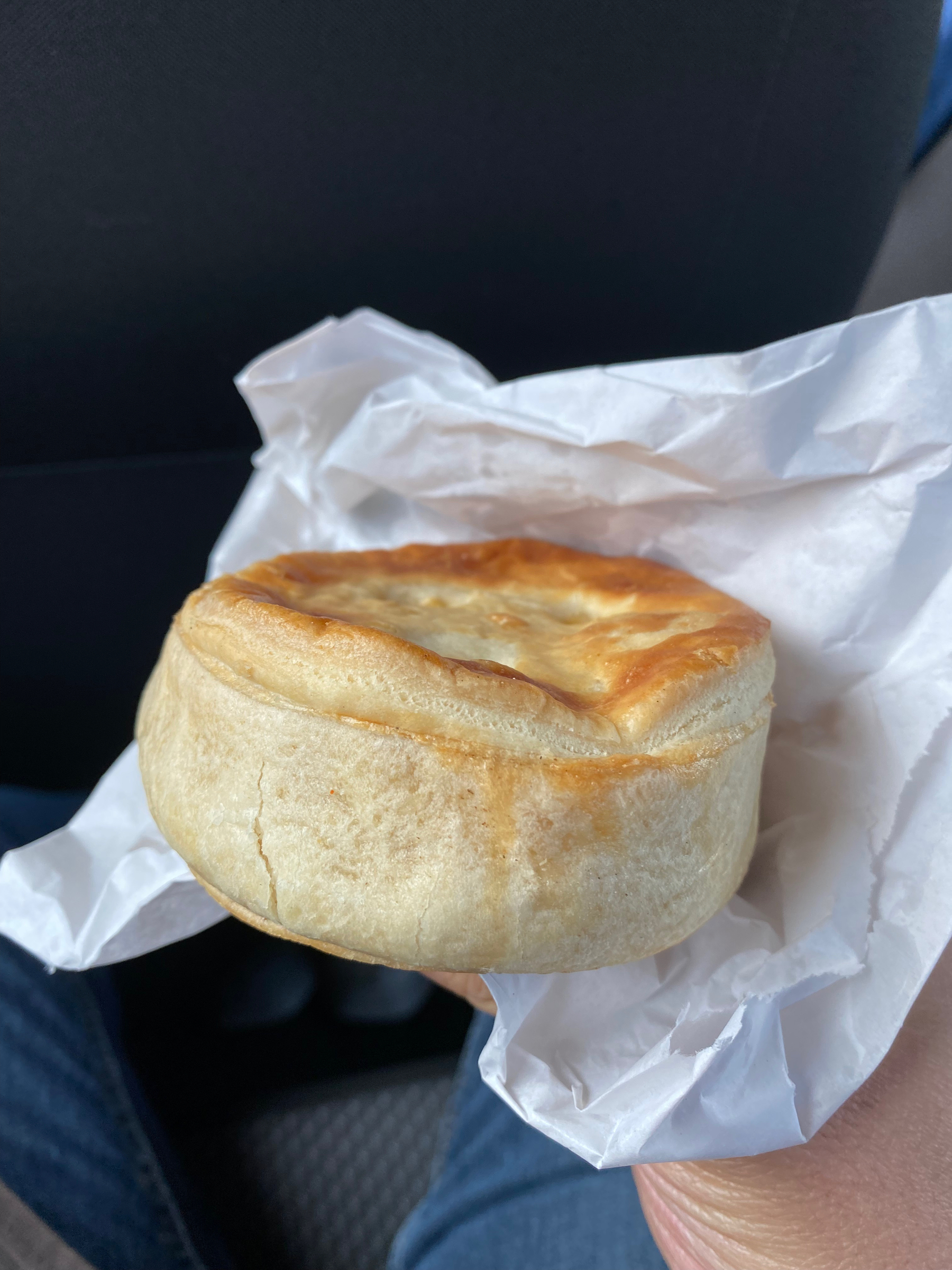
Day 3
We gathered at the church for prayer and fellowship in the morning. It cannot be stressed enough just how important this is to the life of the church.
In the afternoon, we had to head to another church which the ministers oversee so we grabbed more pies to eat on the way there.
Ardeer is a suburb of Stevenson and was once quite busy, as the nearby explosives factory employed many people. Since the factory shut, the community has seen significant decline and is now very deprived. In the middle of that community is a church of about 15 people and we joined them for an afternoon Bible study looking again at 1 Peter.
The conversation seemed like it was going to be quite challenging to make happen but we were very suddenly discussing the meaning of suffering, what happens when we die and how we can be sure that God hears our prayers. It was a really enlightening time and we looked forward to joining them on Sunday.
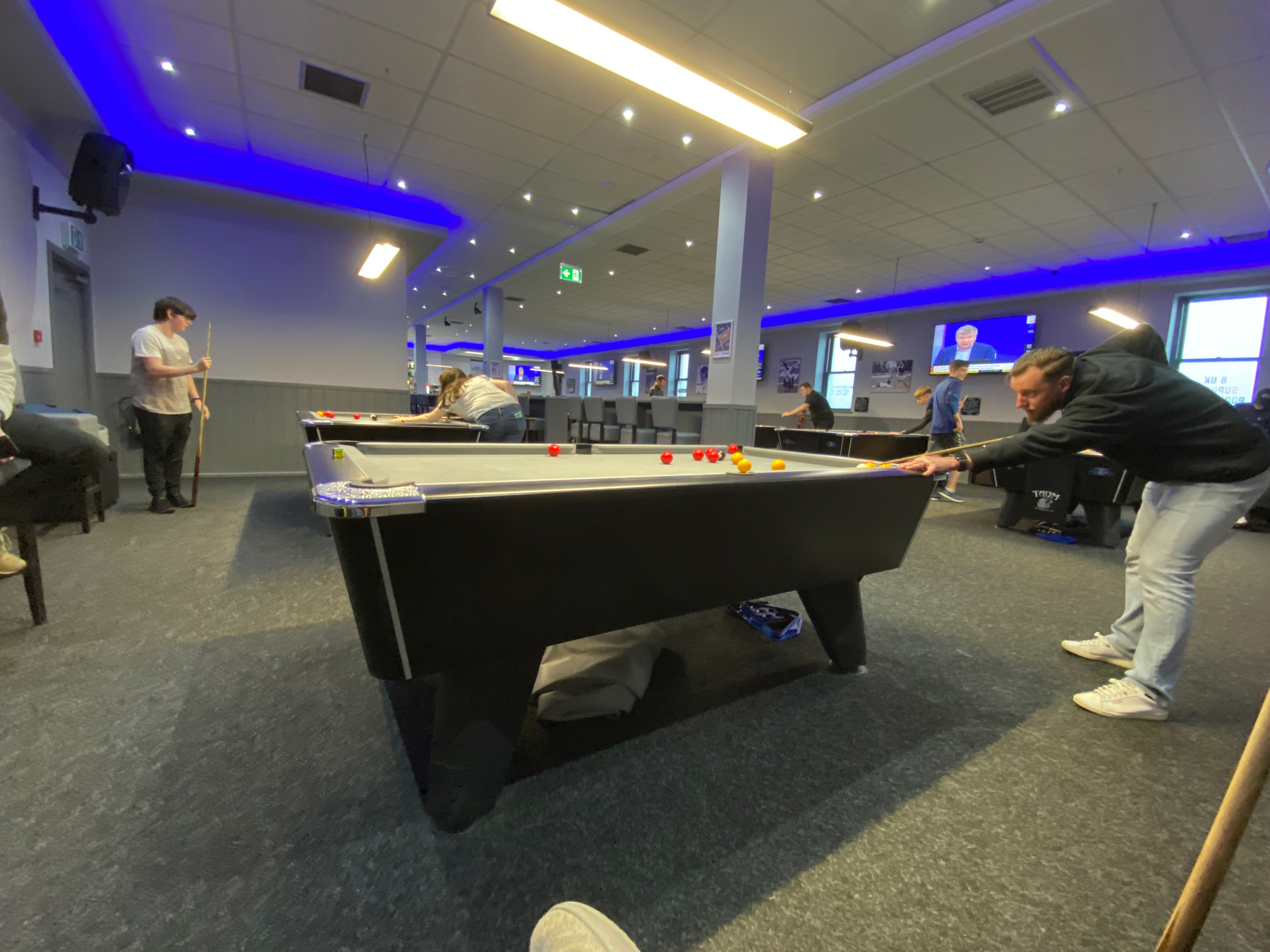
After the Bible study, we went back to Kilmarnock to meet up with Paul, the associate minister, at a pool bar where he would be meeting up with a guy he’s been trying to disciple. Paul is in the process of preparing to plant a church in Onthank, a housing scheme in Kilmarnock which is one of the most deprived areas in Scotland. While the guy didn’t show up, it was good to discuss the challenges of trying to plant in that environment and the need in areas like it.
Day 4
We spent time preparing for Sunday in the morning with Paul. One of us would preach, another do the kids talk and then I would lead the songs. In the afternoon, Paul sent us out into Onthank to get a look at the sort of area it is and where potential work could begin.
It’s a very curious area, there are very few business nearby and only one place where you could eat indoors. Even within this deprived area, there was a clear north-south divide with the northern end of the scheme seeing more income and a nicer corner shop than the southern end.
The area is home to around 6000 people and has only a Roman Catholic Church and a dying, liberal Church of Scotland to serve the area. There is definitely much work to be done there and it is work that needs much prayer.
Day 5
This was a day filled with social gatherings. There was a men’s breakfast in the morning where 17 guys (including us three Cornhill students) met at the local pub for breakfast and to hang out. It was great getting to have conversations and it was clear from many there that being able to just spend time together was so greatly missed.
In the afternoon, there was a youth outing. It was honestly the least… Scottish part of the trip. Nine or ten kids came along to the cinema and then to TGI Fridays of all places. The youth work happening at the church has only come about in the last year with many of them only starting to come to the church during the pandemic!
Day 6
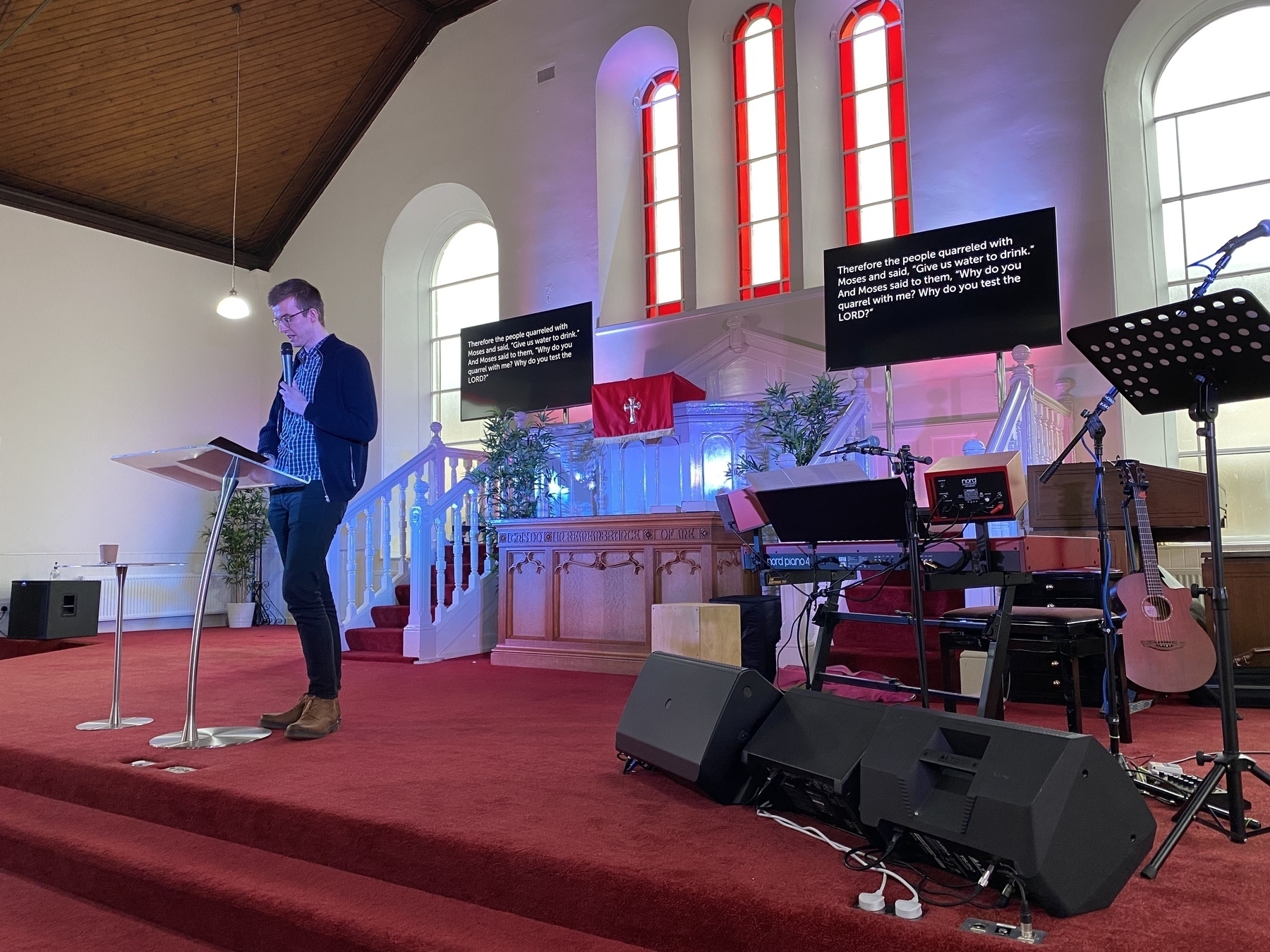
The Lord’s Day. It was a day spent worshipping with two very different churches, but hearing the same very good news. When it was all done, I finally got picked up by my wife and brought back home to be with my family.
some takeaway thoughts
In my time there, I was able to get a glimpse of the sort of work I might be doing in the future. We are seriously considering going into a church revitalisation project. This gave me a chance to see what it looks like for a church that is on the other side of some very significant pain points. To see that the Gospel really is effective and that it is possible for a church to be on an upward trajectory after so long spent on the verge of closing.
The church did an amazing job taking care of us and practicing real, Christian hospitality. Complete strangers made me feel welcome and at home and that is a testimony to how changed this people is by the Gospel.
As well, to see the commitment that the church has to reaching the surrounding area was huge. So much of the talk around church planting is for things to start in the cities and then drift out from there. Here, we have a church in a village of 3000 people getting ready to plant into a deprived community in a town of nearly 50k people. There is no reason for the pattern to always be the same. If the resources and the people are dedicated to the work, it can be done.
Finally, I have a clearer vision for what short term missions can really be about, I was very fortunate to have been sent on a couple of short term mission trips as a teenager. I still remember the experiences that I had. But at the end of the day, it was a sanctified holiday. It was missions as tourism. I think a much better way to approach the whole thing is to send students out to observe, learn and assist in ongoing work while on mission. Putting on big productions or building houses are all worthy things to do but real gospel ministry is much slower and much less visibly spectacular. It’s much more powerful too.